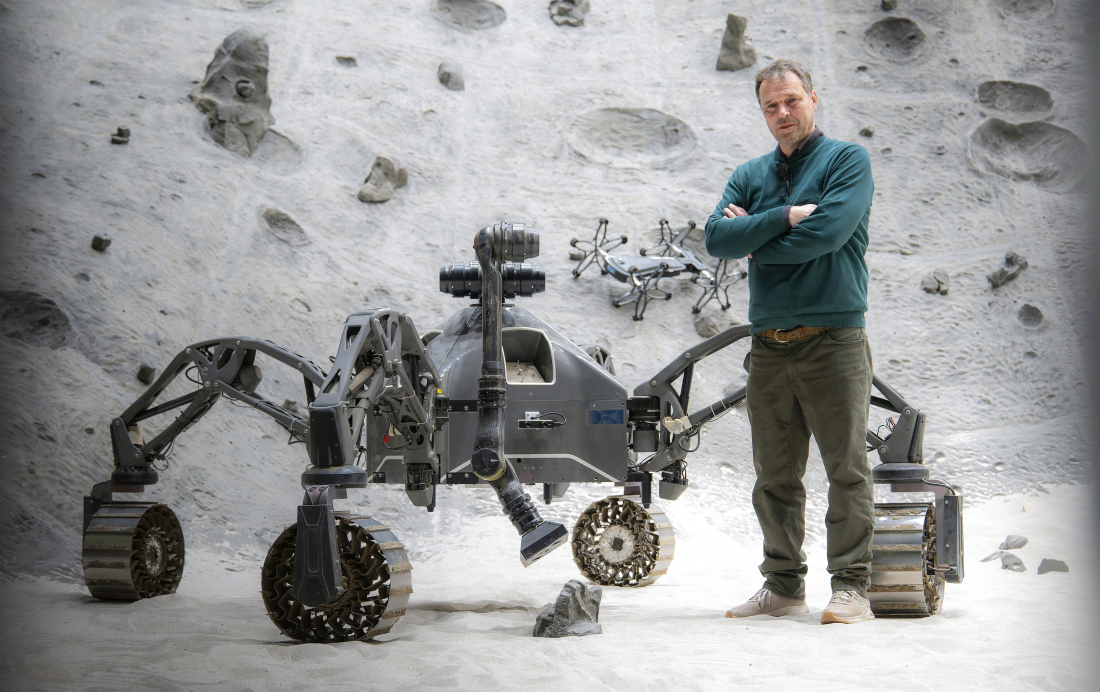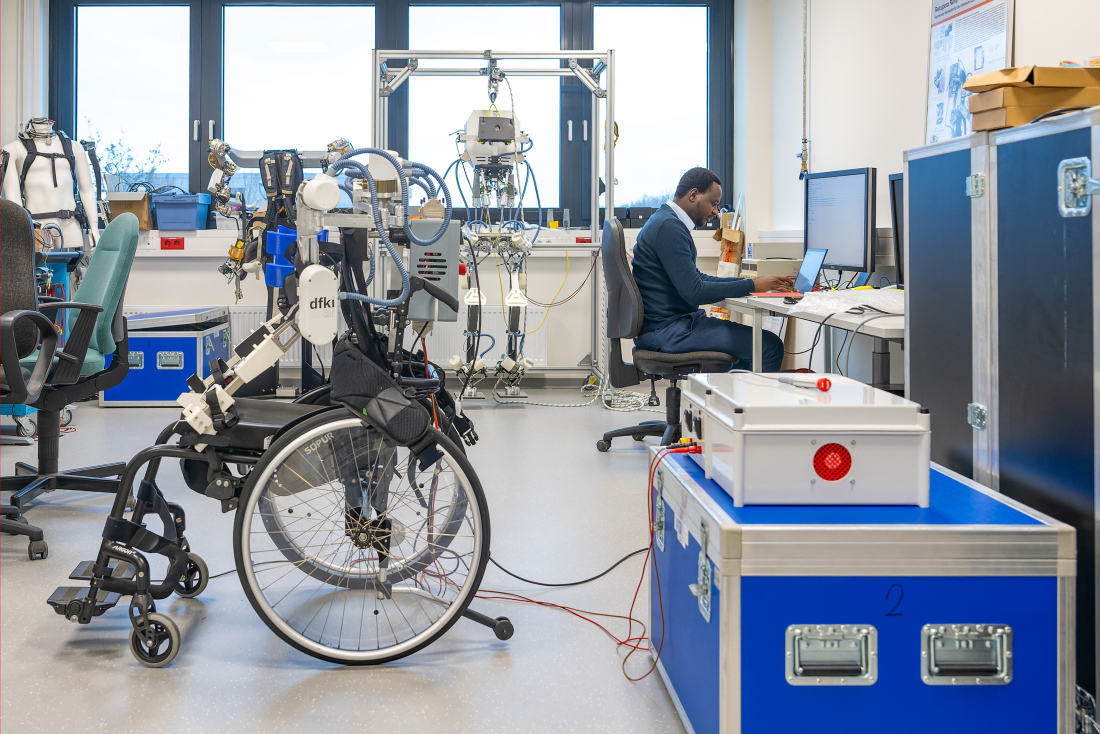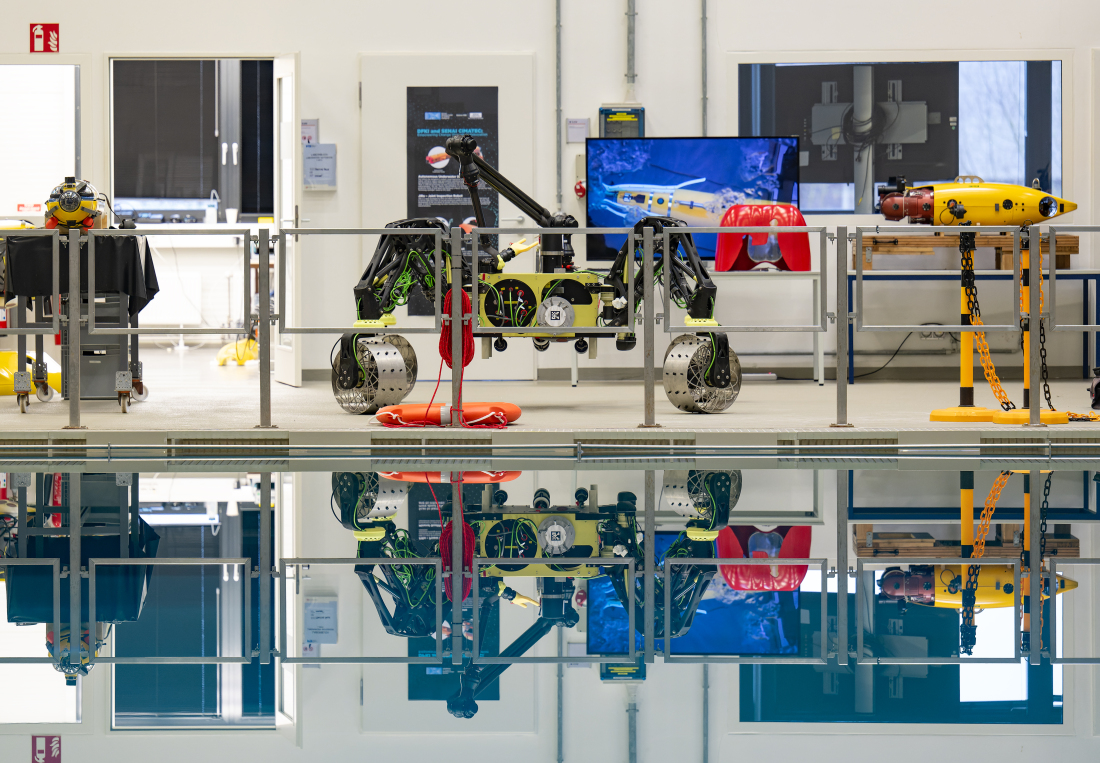Robots "Made in Bremen"
DigitizationPioneering work at the German Research Center for Artificial Intelligence

For the last 18 years, the German Research Center for Artificial Intelligence (Deutsches Forschungszentrum für Künstliche Intelligenz) in Bremen has been at the forefront of research into artificial intelligence, robotics and cyber-physical systems. The researchers are developing innovative solutions that will help human beings, whether on land, sea, in the air or in space.
In 2026, the world's largest international conference on artificial intelligence, the International Joint Conference on Artificial Intelligence (IJCAI), will be held in Bremen. Organisers expect to welcome up to 5,000 experts from the AI research community. "They will be the crème de la crème of AI research", according to Frank Kirchner, Managing Director of the German Research Center for Artificial Intelligence (DFKI) in Bremen. It's not surprising that the Hanseatic city is to host such a prestigious event.
An international multi-disciplinary team is working on fundamental application-oriented research at the Robotics Innovation Center (RIC) in the DFKI. The aim is to develop autonomous mobile robotic systems that are able to interact with their environment, other systems and human beings. This field of research, which brings together quantum computing, AI and robotics, is still in its infancy and pioneering work is currently being carried out at the DFKI in Bremen. The research performed here all contributes to the Hanseatic city establishing itself as an important site for AI. "We've earned an impressive reputation for ourselves", stated Frank Kirchner. The Federal State of Bremen has always supported and promoted these developments, in particular at the DFKI, but also in other areas of AI and robotics. "We couldn't have done all this without them. They had the people who had the vision of creating a hotspot for robotics and AI, which they have achieved."
Focus of research: robotics
At the RIC, AI-based robotics is the main topic of investigative research. But this doesn't mean industrial robots. "What we're doing here is developing robotic systems that are equipped with a certain amount of innate intelligence, enabling them to perform tasks with a degree of autonomy", explained Kirchner, who is also the Director of the RIC. One of the most important research goals that the DFKI is working towards is what is known as "integrative AI". AI systems can perform a specific task extremely well, sometimes better than a human being ever could, but they can only do that one thing. "Our approach is to bring these individual skills together. In the field of robotics, it's also important to connect these systems to the physical reality of the world so we can build machines (robots) that could possibly also provide assistance to human beings."

Quantum computing
However, one of the greatest challenges that the field of autonomous robotics has to overcome is the enormous amount of data involved. Data must be processed as quickly as possible so that robots are able to act independently and respond to unexpected situations in ever-changing environments rapidly. Traditional computers are quickly overwhelmed. Quantum computers could revolutionize the world of autonomous robotics, said Kirchner: "If we are able to use quantum computers, we might well be able to solve many of the problems that today seem insoluble because we don't have the computing power." This is because quantum computers are millions of times faster than a standard PC. They are able to process every possible solution at the same time. "That's unlike a "traditional" computer, which has to test one possible solution after another", explained Kirchner. For the field of robotics, this means that a robot's learning phase, which currently takes so long, could be greatly accelerated and therefore shortened. The robots would learn to identify objects, generate speech or navigate an unknown environment much, much more quickly.
Research in its infancy
It's still very early days for research into quantum-aided computation in robotics. "We're laying the foundations for the application of quantum computers", said Kirchner. The RIC would like to press ahead with this and develop concepts and solutions for areas of application in artificial intelligence and robotics. Intensive research into this futuristic topic is currently on-going in a number of projects which are evaluating and improving existing quantum-machine-supported learning and also developing new methods for robotic applications.
Diverse areas of application
As a Professor at the University of Bremen, Kirchner is primarily involved in pure research. As Director of the RIC, his main focus is on investigating what can be used and where. An example of this is the use of robotics in physical rehabilitation, to help people who have physical impairments. When still a student, Kirchner witnessed a research project in which technology helped a paraplegic woman stand on her own two feet again. This inspired him to make AI robotics his life's work. Kirchner talks about a "lightbulb moment" for his later career. This sector also has much to offer for stroke patients.

Outer space and under water
Robot systems for extraterrestrial use are also under development. They are able to explore difficult terrain or work underwater. Kirchner uses the safe undersea disposal of munitions as an illustration of how these robots can be used. "The Baltic and the North Sea are riddled with the remnants of munitions from the First and Second World Wars. The total comes to a staggering 1.5 million tonnes. Roughly speaking, that's equivalent to the length of a train from Berlin to Paris", said Kirchner. Disposing of these remnants is not only essential for the safe construction of new wind farms, which will contribute to the energy revolution, but also because the munitions are an environmental problem which must also be sorted out. "These munitions have been in the water for 70 to 80 years. The metal casings are rusting away, allowing the gunpowder inside to escape into the sea", described Kirchner. "We have nowhere near enough divers to be able to handle this problem in the usual way. This is why we need automation technology so we can dispose of the hazardous materials in a reasonable timeframe and at a reasonable cost."
The future of work
Robotics can also help in the logistics and production industries, particularly where Industry 4.0 or Work 2.0, in which robots work together with human operatives on production lines, are concerned. This is all taking place against the background of demographic change in which the number of working-age adults continues to fall. Robots can be used for search and rescue in difficult environments and in dangerous or contaminated terrain, such as in fires or at chemical incidents.
"I don't believe we'll ever get to the stage at which we simply set robots off autonomously so that they do everything on their own", stated Kirchner. He thinks of them more as supportive tools. "We need people, but we don't need them all the time." Instead, he rather sees robots as a means to provide support for human beings.
Success Stories
“After all, we're here because someone else made room for us, and it's our duty to do the same for others”
Theoretical physicist, industrial mathematician, manager – as a member of the start-up company TOPAS, Dr. Shruti Patel creates change in Bremen. However, being a role model has not always been easy for her.
Learn more12 Examples of AI in Medicine and the Health Sector
Detecting cancer earlier or avoiding accidents at work - AI will make our lives easier and easier in the healthcare sector. In Bremen, a strong AI landscape is developing in the healthcare sector, as these 12 examples show.
Learn moreThese Bremen companies are developing autonomous systems
Self-driving cars, drones, robots - in Bremen, autonomous systems are a focus of numerous focus of numerous companies. A look at the diverse corporate landscape and where the committed players can be found.
Learn more
